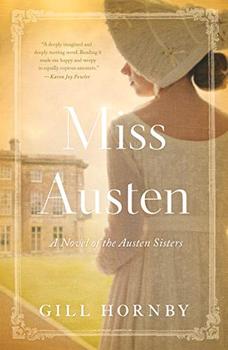Summary | Excerpt | Reading Guide | Discuss | Reviews | Beyond the Book | Readalikes | Genres & Themes | Author Bio

1
Kintbury, March 1840
Cassandra managed a smile but stayed where she was on the vicarage doorstep. She would dearly like to be more effusive—she felt the distant, familiar stirrings of effusiveness somewhere deep down—but was simply too tired to move. Her old bones had been shaken apart by the coach ride from her home in Chawton, and the chill wind off the river was piercing her joints. She stood by her bags and watched Isabella approach.
"I had to go up to the vestry," Isabella called as she came down from the churchyard. She had always cut a small, colorless figure, and was now, of course—poor dear—in unhelpful, ill-fitting black. "There are still duties…" Against a backdrop of green bank dotted with primrose, she moved like a shadow. "So many duties to perform." The only distinguishing feature about her person was the hound by her side. And while her voice was all apology, her step was remarkably unhurried. Even Pyramus, now advancing across the gravel, was a study in reluctance with a drag on his paws.
Cassandra suspected that she was not welcome, and if that was so, could only blame herself. A single woman should never outlive her usefulness. It was simple bad manners. She had come uninvited; Isabella was in difficulties: It was all rather awkward but quite understandable. Still, she once might have hoped for some enthusiasm from a dog.
"My dear, it is so kind of you to let me visit." She embraced Isabella, who was all cool politeness, and fussed over Pyramus, though she much preferred cats.
"But has nobody come to you? Did you not ring?"
Of course Cassandra had rung. She had arrived with great commotion and business in a post chaise so that nobody could miss her. The coachman had rung and then rung again. She had seen people, plenty of them: a steady traffic of laborers balanced on carts coming back from the fields and a group of boys, wet to the knees, with a newt in a bucket. She longed to speak to them—she was rather fond of newts, and even fonder of boys in that fever of innocent passion—but they did not seem to see her. And the house had stayed silent, though that difficult maid—What was her name? Cassandra's memory, always prodigious, was beginning to fray, if just at the edges—must know perfectly well she was there.
"I came at a bad moment. Oh, Isabella"—Cassandra held her arms and looked into her face—"how are you?"
"It has been difficult, Cassandra." Isabella's eyes reddened. "Really most difficult." She struggled, but then composed herself. "But how does the old place seem to you now? Have you been looking around?"
"Exactly as it has always been. Dear, dear Kintbury…"
The vicarage had been a landmark—familiar, ofttimes sad, always beloved—in Cassandra's life for forty-five years. A white, three-story building with a friendly face set east toward the ancient village; garden falling on one side down to the banks of the Kennet, rising on the other to the squat Norman church. It stood testament to everything that she valued: family and function, the simple, honest, good life. She rated this happy piece of English domestic architecture over anything grander—Godmersham, Stoneleigh, Pemberley, even. That said, she dearly would like to be inside it—by the fire, in a chair, getting warm. "Shall we—?"
"Of course. Where is everybody? Let me take that." Isabella reached for the small black valise in Cassandra's hand.
"Thank you. I can manage it." Cassandra clutched the bag to her. "But my trunk—"
"Trunk? Ah." Though Isabella's face remained pale and blank of expression, her piercing blue eyes flashed bright with intelligence. "I am sure it is my fault. I have had so much on my mind." One eyebrow arced. "And your letter arrived only yesterday—was that not odd?"
Excerpted from Miss Austen by Gill Hornby. Copyright © 2020 by Gill Hornby. Excerpted by permission of Flatiron Books. All rights reserved. No part of this excerpt may be reproduced or reprinted without permission in writing from the publisher.




No pleasure is worth giving up for the sake of two more years in a geriatric home.
Click Here to find out who said this, as well as discovering other famous literary quotes!
Your guide toexceptional books
BookBrowse seeks out and recommends the best in contemporary fiction and nonfiction—books that not only engage and entertain but also deepen our understanding of ourselves and the world around us.